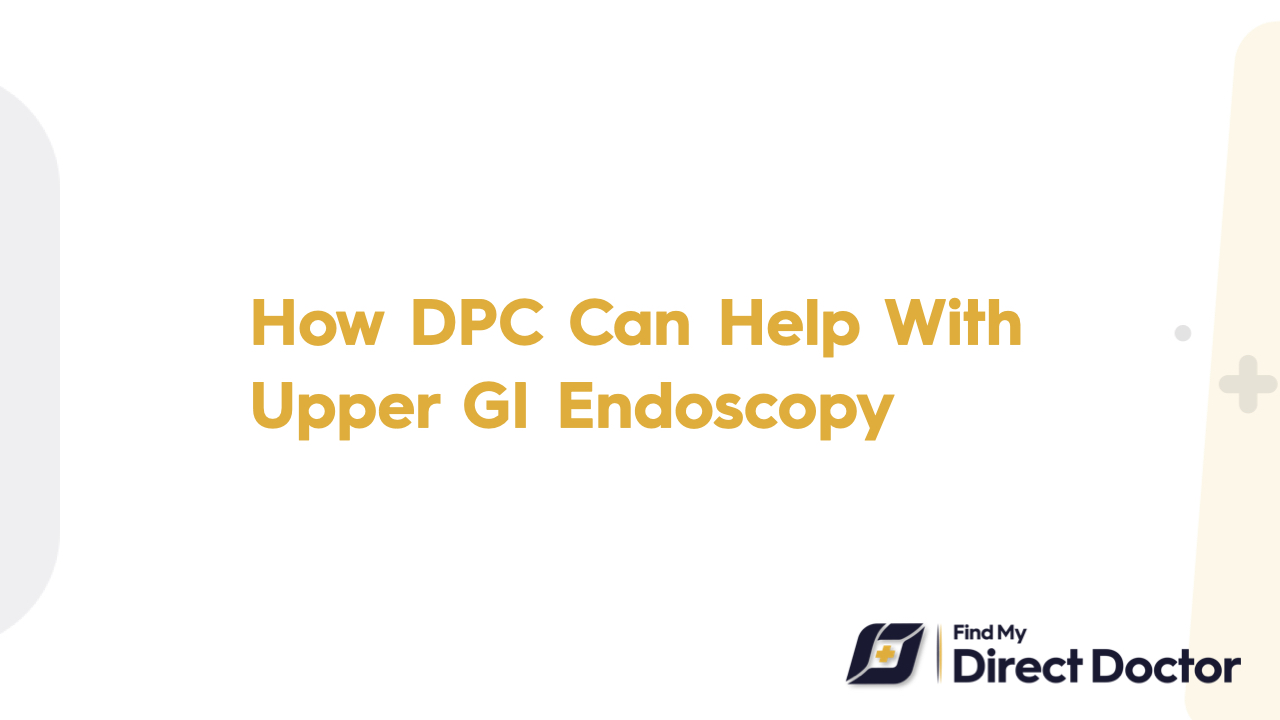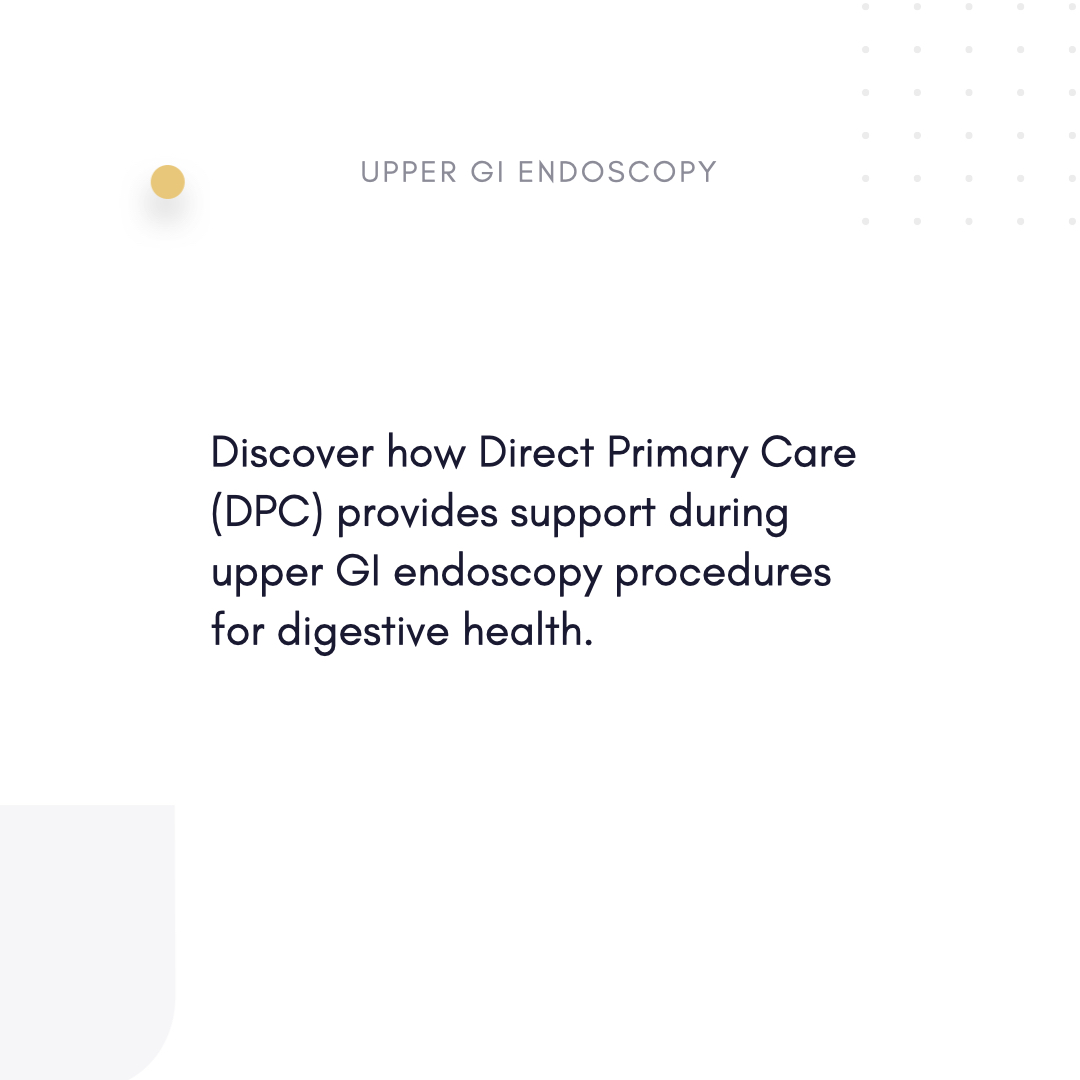Upper GI Endoscopy (EGD) and Direct Primary Care (DPC): Clarity, Comfort, Personalized Care
If you have heartburn, trouble swallowing, or bleeding, an EGD checks your upper GI tract. Concierge Medicine makes sure your procedure goes smoothly, is cheap, and is right for your health.

What you need to know about upper GI endoscopy: Seeing Digestive Health
An EGD looks at the esophagus, stomach, and duodenum with a flexible scope. Important information:
- Uses: to find out if you have ulcers, GERD, Barrett's esophagus, or celiac disease.
- Safety: Low risk (less than 0.1% chance of perforation); sedation used.
- Procedure: 10–20 minutes; biopsies will be done if necessary.
Important facts:
- Prices: Unlike traditional fees (1,500–3,500 USD/procedure), Concierge Medicine memberships (80–250 USD/month) include consultations and follow-ups.
- Risks of delay: cancers that are missed, bleeding that gets worse.
How Concierge Medicine Improves EGD Results
Concierge Medicine changes GI care by putting the patient first and coordinating care in advance.
Complete Before the Procedure Get ready
- Quick scheduling: You can now book an EGD in less than a week instead of three weeks or more.
- How to prepare your bowels: Give clear instructions for fasting (no food or drink for 8 hours before).
- Managing medications: Safely change the dose of blood thinners or diabetes medications.
Clear pricing and full support
- Care that includes everything: The cost of anesthesia, biopsies, and pathology is all covered by membership.
- Saving money: Self-pay Concierge Medicine rates can save you 30–50% on facility fees.
- Dietary counseling: Meal plans after surgery for conditions like GERD or gastritis.
Long-Term Health and Personalized Recovery
- Access 24 hours a day, seven days a week: Take care of throat pain or bloating right away.
- Biopsy results: Check in with a telehealth provider in 48 to 72 hours.
- Focus on prevention: Plan surveillance EGDs for Barrett's or H. pylori.
Advantages of Concierge Medicine for EGD Patients
- No waiting times: Within ten days, 90% of Concierge Medicine patients have an EGD.
- Continuity: One team is in charge of GERD medications, H. pylori treatment, and follow-ups.
- No extra costs: Prices that are clear (for example, 800 USD all-inclusive with biopsies).
Stories of Real-Life Success
- Case 1: Sarah, 50, has heartburn all the time. Sarah's Concierge Medicine team found Barrett's esophagus, and surveillance EGDs stop cancer.
- Case 2: Mike, 35 years old, has iron-deficiency anemia. Mike's Concierge Medicine provider used an EGD to find out that he had celiac disease, and a gluten-free diet cured his anemia.
Common Questions: EGD in Concierge Medicine
- Q: When can I eat after EGD?
- A: Start with liquids and move on to solids as you feel better (1–2 hours after the procedure).
- Q: Will I be sleeping during the EGD?
- A: Yes, moderate sedation makes sure you're comfortable. Get a ride home.
- Q: Can EGD find cancer?
- A: Yes, biopsies can show that there are cancerous or precancerous changes.
- Q: What if they find an ulcer?
- A: Concierge Medicine gives PPIs and tests for H. pylori again.
Why Concierge Medicine is the best place for GI care
The American College of Gastroenterology (ACG) stresses the importance of getting tests done quickly. Concierge Medicine delivers by:
- Cutting down on delays: 95% of EGDs are scheduled to happen within the first few days of symptoms, compared to 60% in the past.
- Increasing adherence: 90% of people who got follow-up care compared to 70% of people in the U.S.
- Cutting costs: By bundling prices, members save between 700 USD and 2,500 USD.
Final Thoughts
An EGD in Concierge Medicine is more than just a scope; it's a partnership that works to keep your digestive health in good shape. With Concierge Medicine, you can skip the wait at the clinic, see the best gastroenterologists, and get a care plan that changes based on what you find. Experience clarity that goes beyond the screen, from preparation to prevention.






